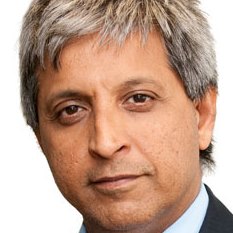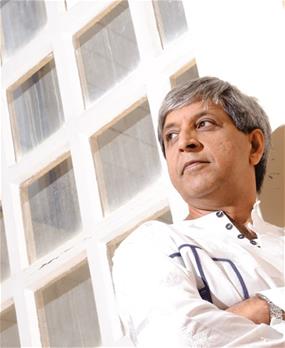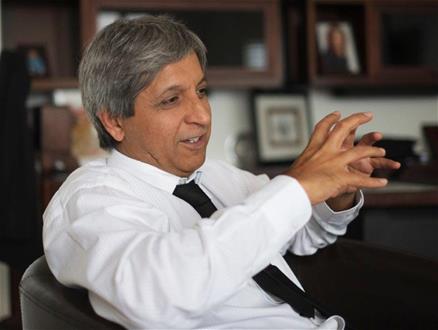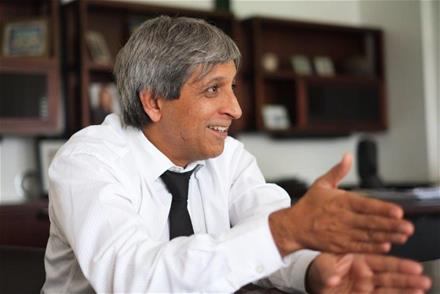
Banner

Talking tachlis, a Q&A with Prof Adam Habib
ANT KATZ
Professor Adam Habib is the Vice-Chancellor and Principal of Wits
ANT KATZ: What are you expecting in general on campus this week?
 ADAM HABIB: Wits has welcomed about 6 200 new first year students and we have met all our enrolment targets – we continue to attract top students from around the country, both from leading feeder schools (public and private) and from non-traditional feeder schools (urban and rural). Welcome Day, Orientation Week and the first day of the new semester proceeded as planned, without disruption. The University is not anticipating protests at this stage, given the number of concessions that we have made to enable the majority of students to register. However, should any protests develop, we have contingency plans in place to ensure that the academic programme continues unhindered.
ADAM HABIB: Wits has welcomed about 6 200 new first year students and we have met all our enrolment targets – we continue to attract top students from around the country, both from leading feeder schools (public and private) and from non-traditional feeder schools (urban and rural). Welcome Day, Orientation Week and the first day of the new semester proceeded as planned, without disruption. The University is not anticipating protests at this stage, given the number of concessions that we have made to enable the majority of students to register. However, should any protests develop, we have contingency plans in place to ensure that the academic programme continues unhindered.
AK: What is the situation with the ‘troublemakers’ who were denied access to campus at the end of last year?
AH: The University is dealing with each student matter individually, in line with the University’s policies and processes.
AK: There have been reports of students looking towards local private universities or going overseas to study due to concerns about whether they will be safe and secure on campus, What precautions have been taken? Are you comfortable that they will be able to write exams this year – and complete their degrees going forward?
AH: Let us be clear about 2016 – Wits lost only three teaching days in total. We completed our examinations, albeit with a heavy police presence on our campuses and students graduated as planned.
 For 2017, the Wits executive is committed to completing the academic programme – this is our mandate and this is what we will try to do as far as possible. It is also our mandate to ensure the safety and security of all. As a general rule, I think that it is important that stability is restored to the higher education sector. Such stability does not mean that we are not committed to lowering the costs of higher education. I am on record as saying that we will partner with students to work towards lowering the costs of higher education but there are two principles that cannot be violated – the first is the principle of non-violence and the second is that there cannot be any permanent shutdown of the university system. The Wits management team and its Council are committed to ensuring that these principles are respected. Achieving a level of stability in the system is important because if we do not do so, we will begin to lose top students.
For 2017, the Wits executive is committed to completing the academic programme – this is our mandate and this is what we will try to do as far as possible. It is also our mandate to ensure the safety and security of all. As a general rule, I think that it is important that stability is restored to the higher education sector. Such stability does not mean that we are not committed to lowering the costs of higher education. I am on record as saying that we will partner with students to work towards lowering the costs of higher education but there are two principles that cannot be violated – the first is the principle of non-violence and the second is that there cannot be any permanent shutdown of the university system. The Wits management team and its Council are committed to ensuring that these principles are respected. Achieving a level of stability in the system is important because if we do not do so, we will begin to lose top students.
There is a real risk that South Africa may lose top students and indeed leading academics to universities beyond our borders because they perceive that South African campuses are not ‘safe’. However, given the recent protests that we are seeing at some higher education institutions in the US and the UK, and considering the current global socio-political dynamics, leaving South Africa may not be a good option after all.
As for private universities, they are unlikely to generate the depth, skills and new knowledge produced by research-intensive universities like Wits. Allow me to share two recent examples to illustrate my case – while a new private university may be able to teach you about geography or geosciences that can prepare you for the world of work, it is not through these universities that new continents will be discovered or where new breakthroughs in testing for TB will be made. Further, the networks developed at universities like Wits, with international links built over decades, world-class scholars and a diverse community, enables students to develop the ‘soft skills’ required to navigate the world in the 21st century.
AK: Regarding the issue of “Colonial syllabi” – is Wits considering changing syllabi/already changing syllabi/retaining existing syllabi?
 AH: We think that the debate on transformation and decolonisation as it relates to syllabi is important and frankly the University has already been involved in this process for some years now. We worry that some of this debate has taken an overtly political flavour and is premised on fundamentally flawed assumptions, such as that science is a Western construct. We are of the view that transforming our curriculum requires both contextualising it in the realities of South Africa but also ensuring that we speak to the requirements of the world in the 21st century. Our curricula need to emphasise our contributions to the world while simultaneously addressing the concrete immediate challenges of our context. It requires the use of technology, as well as, for example, focusing our engineering curricula on the challenges of constructing cities in rapidly urbanising South Africa, or enhancing grain yields in a drought ridden South African context, and transforming our literature curricula to ensure that African authors are also critically studied and engaged. It also requires enabling mobility in our higher education system so that students can move in their studies from institutions like Venda and Limpopo to continue their studies in universities like Wits. We currently have a programme under consideration in engineering where science students from the universities of Free State and Venda, should they perform at a particular level, can complete their engineering degree at Wits. These are innovative attempts to rethink our curriculum and they are part of a curricula renewal that takes place in the academy all over the world. We must not create a caricature between local and global. Our curriculum at its core needs to recognise us as both African and human, and this is the philosophical principle on which all of our curriculum renewal is premised.
AH: We think that the debate on transformation and decolonisation as it relates to syllabi is important and frankly the University has already been involved in this process for some years now. We worry that some of this debate has taken an overtly political flavour and is premised on fundamentally flawed assumptions, such as that science is a Western construct. We are of the view that transforming our curriculum requires both contextualising it in the realities of South Africa but also ensuring that we speak to the requirements of the world in the 21st century. Our curricula need to emphasise our contributions to the world while simultaneously addressing the concrete immediate challenges of our context. It requires the use of technology, as well as, for example, focusing our engineering curricula on the challenges of constructing cities in rapidly urbanising South Africa, or enhancing grain yields in a drought ridden South African context, and transforming our literature curricula to ensure that African authors are also critically studied and engaged. It also requires enabling mobility in our higher education system so that students can move in their studies from institutions like Venda and Limpopo to continue their studies in universities like Wits. We currently have a programme under consideration in engineering where science students from the universities of Free State and Venda, should they perform at a particular level, can complete their engineering degree at Wits. These are innovative attempts to rethink our curriculum and they are part of a curricula renewal that takes place in the academy all over the world. We must not create a caricature between local and global. Our curriculum at its core needs to recognise us as both African and human, and this is the philosophical principle on which all of our curriculum renewal is premised.
The University has a comprehensive transformation plan which is currently being implemented. One component of the plan pertains to reformation of our curricula. This will take place within Schools and Faculties and will be monitored by senior management. I urge you to read the plan – all comments are welcome.
AK: Thank you





nat cheiman
February 8, 2017 at 8:48 pm
‘A known anti Israel stance has not helped ever since the Yoshi Reshef failed concert.
Transformation has indeed taken place under Habib.
From being in the top 3 med schools globally, Wits is now about 240 th. Transformation took place under Habib’
Jonni
February 10, 2017 at 10:54 am
‘Prof Habib has made an enormous contribution to WITS in the face of many difficulties unique to South Africa. He is a well respected academic confronted by the legacy of an apartheid system that denied access to quality education to the majority of it’s population.
To bridge this gap will take time, creative solutions and support from all people including cynics.
His views on the middle east are irrelevant to the quality of education provided at WITS.
‘
yitzchak
February 11, 2017 at 5:47 am
‘Why do Jews donate any money anymore to Wits university? Unfortunately this year 2017 will be marred by more destructive behaviour as exams especially loom large.
\nSorry, Yitzchak, The bulk of your comment has been expunged as it is racist. -ED
\n‘
Harvey
February 14, 2017 at 6:03 am
‘Prof Habib is a well respected academic e and gentleman.
the demise of WITS is a result of the political situation in SA and cannot be blamed on the Professor.’